| Srl | Item |
| 1 |
ID:
124837
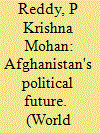

|
|
|
|
|
| Publication |
2013.
|
| Summary/Abstract |
The relationship between Afghanistan and the Shanghai Cooperation Organization (SCO) is a relatively new area of research. This article discusses the interplay between Afghanistan, China and the SCO vis -vis the Bonn 2001 to Bonn 2011 conference. Afghanistan was granted observer status in 2012 in order to facilitate its integration in the wider region and lessen US- NATO influence in the country.
|
|
|
|
|
|
|
|
|
|
|
|
|
|
|
|
| 2 |
ID:
124823
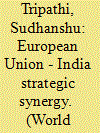

|
|
|
|
|
| Publication |
2013.
|
| Summary/Abstract |
Both the EU and India despite marked dissimilarities may be seen as emerging powers with shared features, interests and challenges. Although the ongoing dialogue between them holds, significant political for building a new world order based on justice, freedom and equality, if continue to underperform as both side have different perceptions of what the dialogue for strategic cooperation for new world order should stand for.
|
|
|
|
|
|
|
|
|
|
|
|
|
|
|
|
| 3 |
ID:
124816
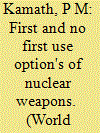

|
|
|
|
|
| Publication |
2013.
|
| Summary/Abstract |
According to PM Kamath, the US as the sole superpower today is unlikely to face a nuclear threat from any other country. Hence as a republic committed to promoting democracy globally, it must embrace the no first use option as tis policy on nuclear weapons to that more nations may be motivated to adopt it. No first use is a far more democratic doctrine than the option of first use and could also be the first step toward global nuclear disarmament.
|
|
|
|
|
|
|
|
|
|
|
|
|
|
|
|
| 4 |
ID:
124833


|
|
|
|
|
| Publication |
2013.
|
| Summary/Abstract |
India's relationship with its neighbours in south Asia has been always influenced by domestic politics. Moreover, there has been a continuous fear psychosis amongst the smaller states of the area, which consider India a regional hegemon. India however needs to adopt the stance of an elder brother rather than a hegemon.
|
|
|
|
|
|
|
|
|
|
|
|
|
|
|
|
| 5 |
ID:
124829
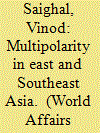

|
|
|
|
|
| Publication |
2013.
|
| Summary/Abstract |
The military build up in the Asian region is perhaps the most massive accretion of arms for any set of adversaries since the end of the Cold War. History bears witness that excessive militarization has leads to an irreversible momentum for the outbreak of hostilities. Often triggered by a minor incident, as nearly happened on India's border in early 2013. There is however potential to restore and maintain stability in the region by the coming together of like-minded countries threatened by not-so-peaceful designs of the Chinese. The key to this stability would be the perception of friendly East and Southeast Asian countries that India is in it for the long haul.
|
|
|
|
|
|
|
|
|
|
|
|
|
|
|
|
| 6 |
ID:
124836
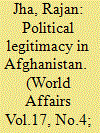

|
|
|
|
|
| Publication |
2013.
|
| Summary/Abstract |
Given the differences between the geographical and socioeconomic basis of the origin of the state in Afghanistan and Europe, it is but obvious that their nature would also differ. The Afghan state directly and indirectly involved various religious institutions, like mosque and Islamic scholars in its day-to-day politics
|
|
|
|
|
|
|
|
|
|
|
|
|
|
|
|
| 7 |
ID:
124795
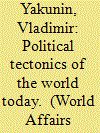

|
|
|
|
|
| Publication |
2013.
|
| Summary/Abstract |
Who is the main beneficiary of the current process of globalised socioeconomic transformation? This article analyses the role of the financial oligarchy operating mainly from and through the US government and suggests that its policies are designed to control energy resources and prices as well as prevent potential rivals from rising. Thus, the European Union, China and Russia as well as other BRICS countries have become primary targets of covert aggression and destabilisation as they seek to present an alternative to the internally weakened global hegemonic system
|
|
|
|
|
|
|
|
|
|
|
|
|
|
|
|
| 8 |
ID:
124835
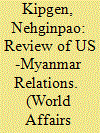

|
|
|
|
|
| Publication |
2013.
|
| Summary/Abstract |
The release of political prisoners by the Burmese government and the successful holding of by-elections were two major landmarks of 2012 that led to improvements in relations between US and Myanmar. The confirmation of Derek Mitchell as the new US Ambassador to Myanmar an the lifting of American investment sanctions followed by the suspension of import bans from the country were significant results of the improving relationship.
|
|
|
|
|
|
|
|
|
|
|
|
|
|
|
|
| 9 |
ID:
124834
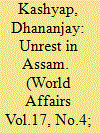

|
|
|
|
|
| Publication |
2013.
|
| Summary/Abstract |
This article draw the picture of some inter-ethnic tensions that beset the northeastern Indian state of Assam and neighbouring ones. It point out that social discrimination and prejudice against the people of the region are wide speared in the rest of India and need to be fought by both the government and civil society. In additional, more efforts must be put into developing the resources of this sensitive but neglected region to create greater prosperity and economic opportunities, notably in the tourism sector.
|
|
|
|
|
|
|
|
|
|
|
|
|
|
|
|